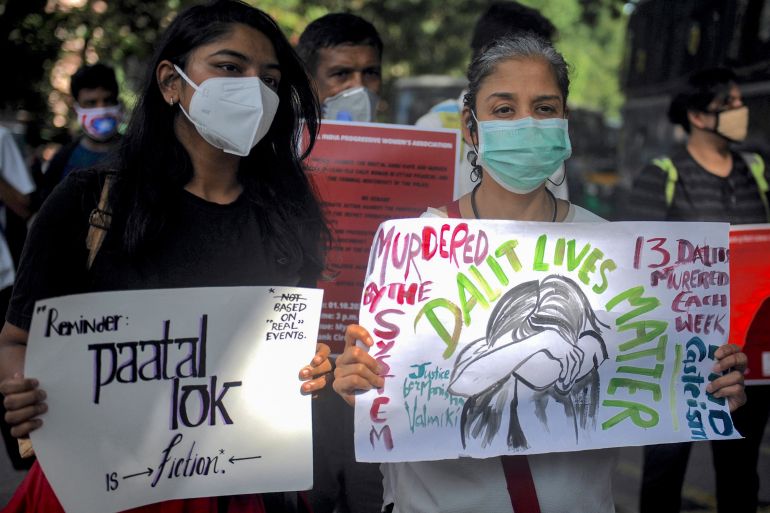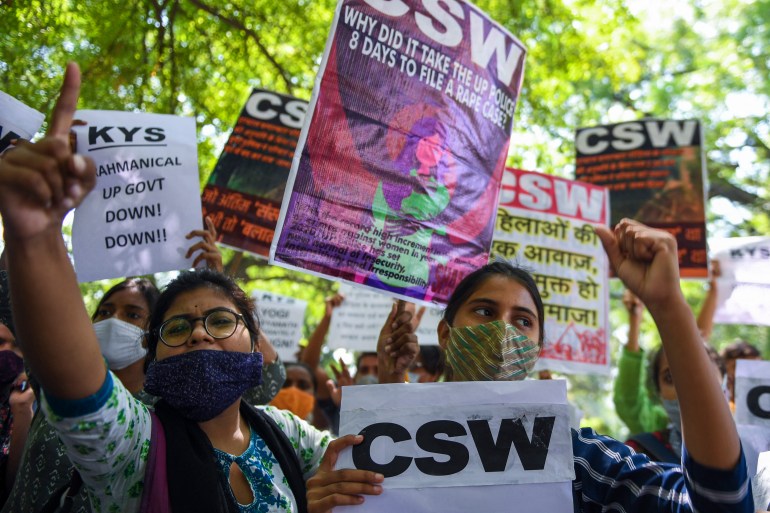Bodies of teenage Dalit sisters found hanging from tree in India
Police say the two minors were gang raped and then hung from a tree in Uttar Pradesh state, adding that six suspects have been arrested.

There is uproar in India after the bodies of two sisters belonging to the marginalised Dalit community were found hanging from a tree in the northern Uttar Pradesh state.
Police suspect the two girls, aged 15 and 17, were gang raped and murdered in the Lakhimpur Kheri district. Six accused men have been arrested, they said.
Keep reading
list of 4 itemsIndia: Why justice eludes many Dalit survivors of sexual violence
A year on, Indian Dalit rape victim’s family waits for justice
Is India’s food security scheme discriminating against Dalits?
Sanjeev Suman, the police chief in Lakhimpur Kheri, told reporters the two minors, residents of Tamoli Purva village in the district, were lured to a nearby field on Wednesday afternoon and allegedly raped by the accused.
“The men allegedly strangulated them with their scarf and hung them from a tree. The investigation is on,” he said.
Police identified the six accused as Chhotu, Junaid, Sohail, Hafizul, Karimuddin, and Arif. They said Chhotu is the victims’ neighbour and had introduced the two sisters to the rest of the men a few days ago.
Dalits, formerly referred to as the “untouchables”, fall at the bottom of India’s complex caste system. For centuries, they have been victims of discrimination and persecution by privileged caste groups despite laws in place for their protection.
Ram Gautam, the uncle of the girls and a construction worker in Lakhimpur Kheri, said the family is waiting for a postmortem report.
“We are shocked. The younger one was a high school student and the older one was a school dropout,” he told Al Jazeera.
On Wednesday, the residents of Tamoli Purva village blocked roads in protest against the gang rape and killing of the two Dalit sisters.
Uttar Pradesh is considered one of the most unsafe Indian states for women. The National Crime Records Bureau (NCRB) data shows that crimes against women in India’s most populous state increased by 15 percent in 2021 compared with the previous year.
The NCRB data also shows that there was a 45 percent increase in reported rapes of Dalit women between 2015 and 2020 in India.
In 2020, a 19-year-old Dalit girl was gang raped and murdered in Uttar Pradesh’s Hathras district. The incident sparked weeks of protests and outrage after the police were accused of forcibly burning the victim’s body in the dead of the night. A Muslim journalist on his way to report the crime was arrested.
In October last year, a similar incident was reported in Uttar Pradesh’s Amroha district where a teenage rape survivor was murdered by the accused neighbour and her body hung on a tree. In the same state’s Badaun district in 2014, the bodies of two cousins were found hanging from a tree.

Opposition leaders and activists are demanding answers from the state government led by the right-wing Bharatiya Janata Party (BJP), which also heads the federal government.
Senior Congress Party leader Priyanka Gandhi said the Lakhimpur Kheri incident was “heart-wrenching”.
“The relatives say that those girls were abducted in broad daylight. Giving false advertisements in newspapers and TV every day does not improve law and order. After all, why are heinous crimes against women increasing in Uttar Pradesh?” she asked in a tweet.
In response, Himanshu Dubey, the media incharge of the BJP in Uttar Pradesh, told Al Jazeera there is “zero tolerance for crimes” in the state.
“The criminals have been nabbed. In Uttar Pradesh, no matter who the people are behind a crime, the government is tough against them,” he said.
New Delhi-based feminist and activist Kavita Krishnan said Uttar Pradesh since 2017 is being ruled by an “aggressive Hindu supremacist ruler whose rule has emboldened criminals, especially those who indulge in violence against oppressed caste, women and minorities”.
The state is ruled by the BJP’s Yogi Adityanath, a saffron-clad Hindu monk known for his anti-Muslim hate speech as well as controversial statements on women.
“Generally, it (state) has great lawlessness because he (chief minister) is someone who has made no secret of his contempt for the idea of respect for women’s rights and women’s equality,” Krishnan told Al Jazeera.